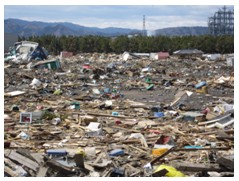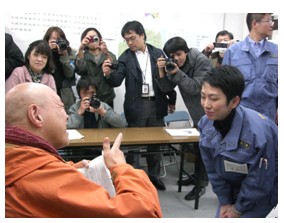You're not alone! Rely on one another.
Support Center Fukushima News "UNITE(Tsunagari)" No.1
Issued by JDF Support Center Fukushima for Persons with Disabilities in Devastated Area on April 11, 2011
Address: Room#102 YK Bldg., 21-10, 2-Chome, Asahi, Koriyama City, Fukushima JAPAN 963-8024
TEL & FAX: +81-24-925-2428
Japan Disability Forum (JDF) opened JDF Support Center Fukushima for Persons with Disabilities in Devastated Areas in Koriyama City on April 6. At the opening ceremony, more than 60 people participated including Mr. Toshihiro Azuma (Head of Cabinet's Reform Council of Persons with Disabilities), officers of welfare service for persons with disabilities divisions from both Fukushima Pref. and Koriyama City, members of support groups or centers as well as managers of JDF. Local newspapers joined for interview as well. Minister of State for Special Missions Renhou also visited the center on Saturday the 9th, and was handed requests to.
Cumulative totals in the survey as of April 9
- Numbers of offices for persons with disabilities: 39
- Numbers of shelters: 83
- Numbers of counseling & action: 90
- Numbers of hotline call: 15
▆Survey results from welfare service offices for persons with disabilities from March 19 through April 2 (Initial Report)
We visited offices in Souma, Futaba & Iwaki areas.
As for other areas, we researched offices including workshops and community support centers across Fukushima Pref. over telephone.
We obtained information about admission and day-care facilities from local governments or intellectual disability-related organizations.
- Collected from 85 offices out of 85 (Collection rate is 100%)
- Building damage: 14 offices were partially destroyed and 71 offices were unaffected.
- Concerns except for building, lifeline and access issues.
- Have no prospects of reopening because we're under orders to evacuate due to the nuclear accident.
- Have no idea which way to turn due to the nuclear accident.
- Feel anxiety as family members evacuate discretely.
- Worry about mental and physical conditions who go out of Fukushima Pref. for safety.
- Lack of staffs due to their evacuation.
- Farming is restricted due to radiation-contaminated.
- Lack of information.
- Lack of gasoline prevents us from reopening.
- Difficulty to obtain psychotropic drugs.
- Drop in income because of jobless.
- Uncertain future.
- All working machines & cars are out of order due to tsunami.

Devastated area stricken by the disaster
▆Survey results from shelters (northern, central and southern Fukushima, Aizu, southern Aizu area)
Highlighted issues (keywords)
- Run out of living expense.
- Cannot pay the facility-use fee.
- Cannot keep living at a shelter.
- Nursing care of parents cause others trouble.
- Cannot see a doctor & dose regularly for those who have mental disabilities.
- Uncertain future
- Get tired of eating instant noodles.
Work logs showed…
Workshops & offices
have no prospects of reopening. Most of the users of two offices have returned their homes because of difficulties to keep living at shelters even though they are under orders to standby indoor as the nuclear plant is located within 30km. Some offices which have corporate status & run multi business decide to reopen even though 19 users out of 40 return homes, 3 staffs out of 11 are available as remaining 8 staffs go out of Fukushima Pref. for safety. However, approvals of business continuity are suspended by the government because they are not ready to take responsibility.
Provision of supplies:
- Nine cars were swept away from a office by tsunami. One car is gifted from Kumamoto and another car is offered in response to appeals by disabilities-related organizations all over Japan. Household goods are also presented together. Feel grateful for the support from across the country.
- Water supply is still suspended. Baking offices receive water as a relief good from all over Japan.
- Foods are delivered by increments, however, most of them are poorly balanced meals such as instant noodles or boil-in-bags. Hard to request because we rely on others. Delivering well-balanced foods is an imperative issue to be solved.
Update status:
- Some were visited by an earthquake & tsunami during a dialysis treatment, which forced eight family members evacuate discretely & take two shelters separately. A voluntary transportation to and from a hospital is only way to take dialysis three times a week.
- Overall, refuge life comes to the next stage as their requests move from first-aid to quality improvement such as being settled in again, reopening offices and worrying about uncertain future. What is worse is that victims of Fukushima Pref. are visited by the nuclear accident and are in a state of high anxiety.
"Handing requests to Minister of State for Special Missions Renhou"

Mrs. Renhou was handed the requests of persons with disabilities at the site.
Mrs. Renhou visited JDF Support Center Fukushima for Persons with Disabilities in Devastated Area on Saturday of 9th. The center reported the current status of the disabled persons who were evacuating and handed requests (10 items) from refugees together. Cabinet's Director General for Policy Planning (Inclusive Society) Atsuko Muraki accompanied as well. Mrs. Renhou told, "Disabled persons are going through difficult times due to an earthquake and tsunami as well as a nuclear accident in Fukushima. We must go into high gear for supporting people who are vulnerable to disaster."
Requests from refugees (abstract)
- Delivery of healthy meals at shelters.
- Support for disabled persons who are under orders to evacuate to designated shelters.
- On demand welfare services without disability certificates.
- Provide name lists of disabled persons at home by government authority when necessary.
- Barrier-free temporary housing depending on numbers of disabled persons. Universal design is necessary for town planning.
- Considerations and supports for medical fronts.
- Disabilities-characteristics-sensitive support at shelters.
- Aid programs for supporting organizations are necessary as soon as possible.
- Disclosed information about nuclear accident.
- Pursue disaster contingency planning into Basic Act for the Disabled Persons.
Translated by Japanese Society for Rehabilitation of Persons with Disabilities
Volunteer translator : Mr.Eitaro Ono
